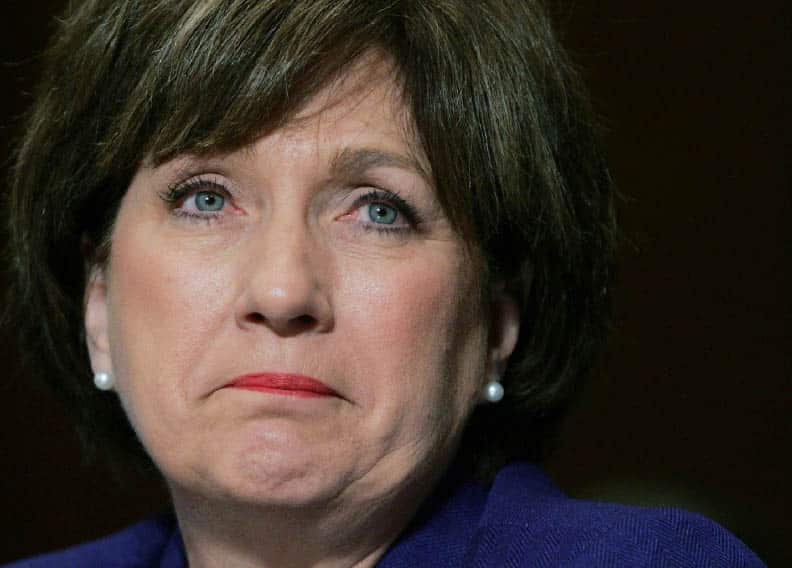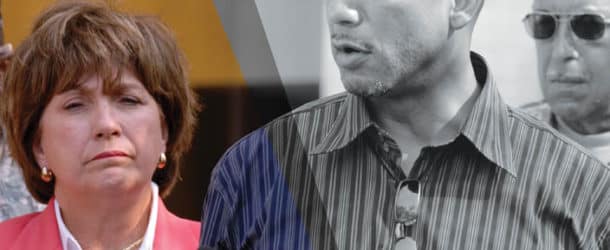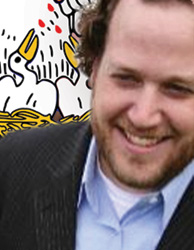By Jeremy Alford and Mitch Rabalais
Born to a carpet cleaner in the French-speaking hamlet of Coteau, La., Kathleen Babineaux first viewed a small piece of her native Louisiana in 1942, just 10 days before Christmas.
Her parents, Louis and Lucille, never strayed far from the small bayou communities of Acadiana. Neither did their first of six children, who grew into a young lady with “no political ambitions” and a “huge heart.”
She went on to attend elementary school in New Iberia, graduate from college in Lafayette and teach business concepts to high schoolers in Breaux Bridge.

Dejected, Blanco went home to coexist with the washing machine and mop and the chaos of a house brimming with family. On the kitchen table lay a distraction, wrapped in the pages of The Advocate. One item caught her attention. Luke LeBlanc, her state representative, was retiring.
Along the way, she married Raymond “Coach” Blanco, in 1964 — two years after he elevated Catholic High School in New Iberia to an unlikely state championship. The first-of-its-kind regional win granted him legendary status among the sugarcane fields, dance halls and churches of Louisiana’s Cajun heartland. By the time he did it twice more as an assistant coach at what is now the University of Louisiana at Lafayette, he was walking in high cotton.
Among the few things that could trump football at the time was politics. The rhetoric and antics of the candidates, practically all of them men, could rip holes through the lands Thomas Jefferson purchased at a discount. Yet those same populist pirates and perennial reformers, with the same rhetoric and antics, could just as easily repair those tears, all the way from the coast of Cameron up to the Claiborne state line.
That world fascinated Coach Blanco, although he was more focused on campus politics by the 1970s, when a need for stern leadership was advancing him along the pecking order of deans. His wife continued to teach in the years following their union, until she became pregnant and took a temporary leave of absence.
As she watched her husband’s “huge public persona” grow, Blanco welcomed their first child, and then their second, to the world. And she thought about returning to work. Then there was child three and child four, which were followed by child five and child six. The temporary leave from her teaching job seemed to have become permanent.
*************************
After 16 years of diapers and teething, terrible twos and crayon-accented walls, mood swings and puberty cycles, graduations and breakups, 1980 came into focus in a new way for Blanco. She landed a job with the U.S. Commerce Department as a district manager for the Decennial Census. Soon after, she partnered with Coach on the family’s new consulting and polling firm — a source of income and a hobby the Blancos would nourish over the next four decades.
For a time, she pursued a career in insurance through a local State Farm branch. After weeks with no response, Blanco delivered a simple ultimatum to the secretary of the man who had been her primary contact. Either he return her calls or she would camp out in the reception area until he met with her. Which he did, begrudgingly.
“I’m just uncomfortable hiring a married lady with children,” the man said candidly, based on Blanco’s recollections. “Look, this kind of job is going to put too much stress on your little family.
“And, heaven forbid,” he added for good measure, throwing his hands up, “I don’t want to be responsible should you get a divorce.”
No matter where life took her in the coming decades, she never forgot about the slight.
“I took great pleasure as governor of telling that whole story to the national head of State Farm,” she said.
Dejected, Blanco went home to coexist with the washing machine and mop and the chaos of a house brimming with family. On the kitchen table lay a distraction, wrapped in the pages of The Advocate. One item caught her attention. Luke LeBlanc, her state representative, was retiring.
*************************
In 1983, Blanco ran for an open seat in the Louisiana Legislature, shocking even Coach. Blanco had never even been to the Capitol in Baton Rouge. But she did it the hard way, knocking on doors and carrying push-cards that were designed by her husband, who had plenty of polling data.
“Nobody inspired her; she was a self-motivator,” said Coach. “I told her, ‘You have to make your own name.’” She worked hard, and she would come home at night and we would talk politics.”
She won, and no one was more surprised than herself. Just like that, Blanco became state Rep. Blanco — the first female lawmaker elected out of the Lafayette region, and one of only five women serving in the Louisiana Legislature.
“I had no political ambitions,” she said. “But I thought to myself, ‘I’m going to do public service, where I’m not going to make a lot of money and get rich, but it will be personally fulfilling and rewarding.’”
The political world truly opened up for then-Representative Blanco when she became Commissioner Blanco, thanks to a 1988 upset that placed her on the Public Service Commission. Huey P. Long, Jimmie Davis and “Big John” McKeithen had all sat on the PSC before capturing governorships. So the office came with a touch of mystique, which in turn lifted Blanco’s profile.
“The minute you get onto the Public Service Commission in Louisiana, people assume that you’re going to run for governor,” she said. “I thought that was so uniquely bizarre, because that was never my intention … I didn’t have that vision of me being the governor at that point.”
History had set its sights on Blanco, who was the first woman elected to the PSC and the first woman chosen to serve as its chair. By 1991, she was ready for prime time and became an official candidate in a dramatic race for governor.
From The PSC To No. 2
Almost as soon as she launched her bid for governor in 1991, then-Public Service Commissioner Kathleen Babineaux Blanco was out of the race.
“I called (Secretary of State) Fox (McKeithen) and said, ‘Take my name off the ballot,’” Blanco said. “I didn’t have enough money to buy television. I called all around the state, and I had what I had in the bank plus what people thought they could raise, which is never a number you can count on. But it came out to $180,000 in September. And it cost about $40,000 to make ads at that time. And I just thought that would be a colossal waste of money — to make those ads and then have them sit in the closet somewhere and never be shown because we didn’t have any money.”
She stuck around the PSC until 1996, when voters promoted her to lieutenant governor — a post she maintained for eight years. By the time she was elected and sworn in, Lt. Gov. Blanco had a tried and tested political team around her. She had found her “Holy Trinity.” “(Coach)Raymond (Blanco), I and (media consultant) Ray Teddlie were such a team,” Blanco said. “I mean, we felt invincible most of the way. We had our moments, you know …. Ray Teddlie did my ads for lieutenant governor, and my ads were so different. Now, when he came over, we immediately were all on the same plane. Raymond, he was a football coach, so he understands strategy. And then I had this overall grasp of what kind of messaging we wanted out … We were just doing brainstorming for a couple of weeks.
“My daughter was pregnant with our first grandchild, and I said, ‘Ray, we need to use that. That’s a good thing. Because what the lieutenant governor should be doing is for the future. Not just for the present; and it’s not just for the politics.’ Well, he took my words and he rearranged them. We had an ad.”
************************
Once ensconced in Baton Rouge, the new lieutenant governor turned her attention to the state’s tourism industry and the museums under her control — both among her primary responsibilities. She also, rather deliberately, cultivated a relationship with the Governor’s Mansion’s new occupant.
“I ran for lieutenant governor and I won that seat and served there for eight years while Mike Foster was the governor,” she said. “And he and I were friends. He was a Republican; I was Democrat. And that never had been a problem between us. He was a Democrat until the day he signed up to run for governor. We had supported him when he ran for the Senate. In fact, Raymond ran a poll for him before he ran for the Senate and went over to Franklin. Raymond walked into the room, walked up to Mike, and said, ‘Congratulations, senator, you’re going to win.’”
Foster’s hands-off style meshed well with Blanco’s independent spirit. “Mike Foster just kind of got out of the way and let me go as far as I could go,” she said. “But I was never unreasonable, and my priorities matched his priorities. So it made it easy for him to support me in my endeavors.
“He became more Republican as the eight years wore on.”
*************************
Early in her second term, Lt. Gov. Blanco was attending a function with her husband on the UL-Lafayette campus when she was introduced to one of Gov. Foster’s eager young lieutenants. Then in his late 20s, Piyush “Bobby” Jindal served as health secretary before agreeing to run the University of Louisiana System.
After their initial meeting, the Blancos didn’t know what to make of the wunderkind. But as Blanco inched closer to the looming governor’s race in 2003, Foster inched closer to Jindal’s side.
“I forget how Bobby Jindal got thrown into the mix,” she reflected. “But (Foster) became infatuated with Bobby. And when I ran for governor, he actually supported Bobby. But he would still, kind of, always be measured in his support. Bobby had worked for him. He was a protege of Mike’s. I understood all that.”
The crowded gubernatorial field of 2003 smacked of 1991; it was loaded with political heavyweights, mostly from the Capitol’s orbit. There was former Gov. David Treen, Attorney General Richard Ieyoub, state Senate President John Hainkel, former state Senate President Randy Ewing, former state House Speaker Hunt Downer, former state Sen. J. E. Jumonville, state Sen. Ken Hollis, and Legislative Auditor Dan Kyle. For good measure, former Congressman Buddy Leach made the list as well.
“It was a powerhouse,” Blanco said. “I mean, seriously, a powerhouse field for Louisiana politics at that time.”
Also briefly in the race was state Treasurer John Kennedy, then a fellow Democrat. He would eventually drop out of the contest. Kennedy and Blanco crossed paths countless times in subsequent years — including during his well-documented stint as her anti-governor.
Two other major candidates, U.S. Sen. John Breaux and Congressman David Vitter, both seriously considered entering the race, but opted to remain on Capitol Hill. The lieutenant governor, meanwhile, was undaunted. She and many others believed the time had come to shatter the Bayou State’s highest glass ceiling.
That newfound sense of direction and confidence was on display when the UL System hosted one of the cycle’s first forums. Blanco arrived early and grabbed the seat in the middle of the table — where the frontrunner traditionally sat.
Perched in the prime seat, she sized up her opponents, wondering what the future could hold for them, as well as herself.
“As each one walked in, I thought about each individually and I knew them all,” Blanco said. “Now, Bobby Jindal was not in that group yet. I thought about them and where their careers had taken them and how they had shaped their public personas. I just felt very strongly in that moment that I could beat them all. And I don’t get those revelations regularly, you know.”
An oral history recorded Aug. 14 inside the Blancos’ Lafayette home served as the basis for this series. The final part of the story will be published in the next issue of Lagniappe.
For more Louisiana political news, visit www.LaPolitics.com or follow Jeremy Alford on Twitter @LaPoliticsNow.
















Comments are closed.